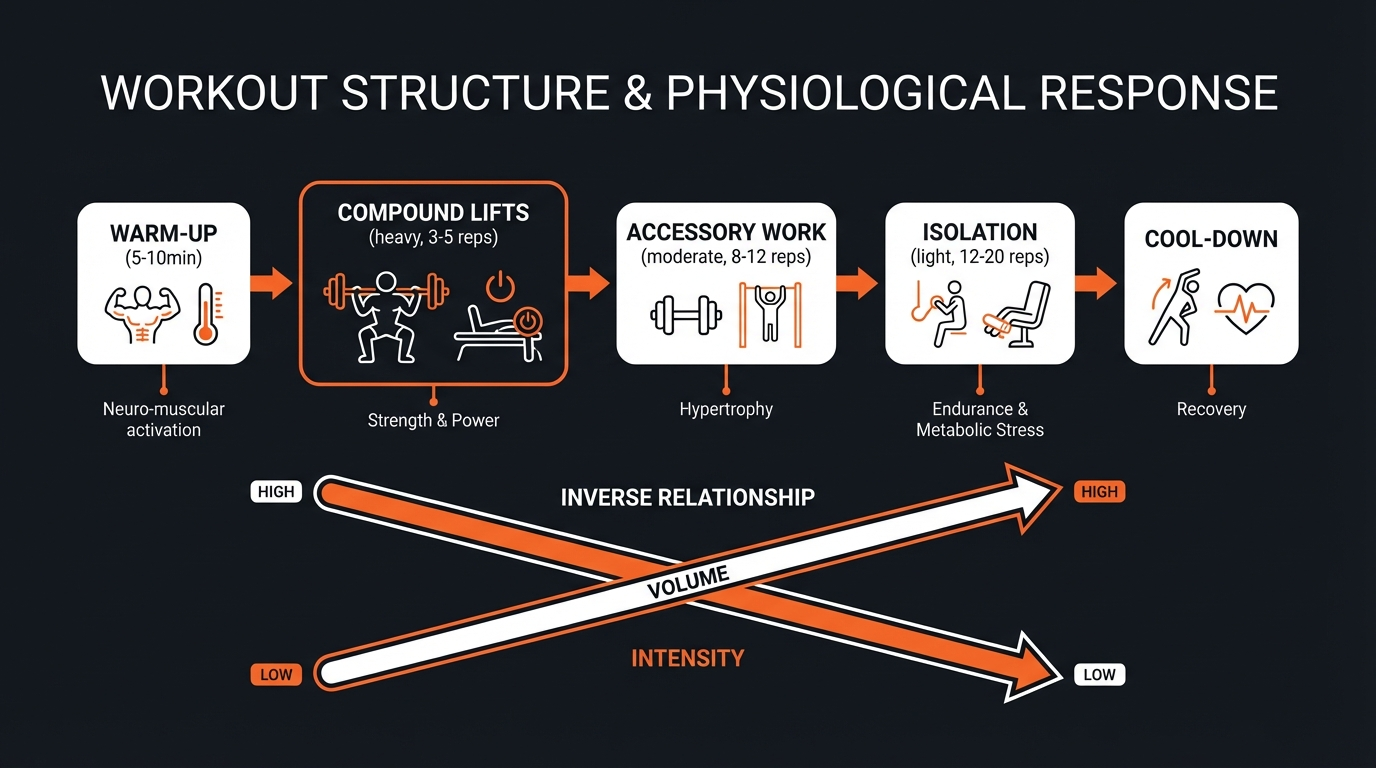The Ultimate Guide to Pre and Post-Workout Nutrition
Read our comprehensive guide on the ultimate guide to pre and post-workout nutrition.

Key Takeaways
- Eat complex carbs like oatmeal 2-3 hours before your workout to fuel your muscles properly.
- Get protein within 30-60 minutes after training to kickstart muscle repair and recovery.
- If you're short on time, a banana with peanut butter 30-60 minutes pre-workout will do the job.
- Aim for 0.14-0.23 grams of protein per pound of bodyweight after your session.
- Working out fasted might burn more fat but can hurt your performance and cause muscle loss.
Get a Free AI Coach on WhatsApp
Ask questions, get workout plans, and track your progress — all from WhatsApp.
Message Your CoachWelcome fitness enthusiasts! Whether you are a seasoned athlete or a beginner, fueling your body properly before and after workouts can make a significant difference in your performance and recovery. This comprehensive guide covers essential aspects of pre and post-workout nutrition to help you achieve your fitness goals.
Why Pre-Workout Nutrition Matters
Pre-workout nutrition is crucial for providing your body with the energy it needs to perform optimally during exercise. Consuming the right nutrients before your workout can boost your performance, conserve muscle mass, and improve overall endurance. But what exactly should you eat?
- •Carbohydrates: As the body's primary energy source, carbs are vital for fueling your workout. Opt for complex carbs like oatmeal, quinoa, or whole grains, which release energy gradually.
- •Protein: Including protein in your pre-workout meal supports muscle repair and growth. Consider foods like eggs, yogurt, or lean meats.
- •Fats: Healthy fats can be included in small amounts. Avocado, nuts, or a small amount of olive oil can provide sustained energy.
Ideally, consume your pre-workout meal about 2-3 hours before exercising. If you are short on time, a light snack, such as a banana with a spoonful of peanut butter, 30-60 minutes before your workout can also suffice.

The Best Foods to Eat Post-Workout
Post-workout nutrition is equally important as it aids in faster recovery, minimizes muscle soreness, and replenishes glycogen stores. This is particularly essential after intense or prolonged workouts. Here's what to focus on:
- •Protein: Aim to consume protein within 30-60 minutes of completing your workout. Whey protein shakes, chicken breast, or tofu are great options to kickstart muscle repair.
- •Carbohydrates: Post-workout carbs help replenish glycogen stores. Fruits, sweet potatoes, and brown rice are excellent choices.
- •Hydration: Don't forget to rehydrate! Water is essential, but you might also consider a sports drink if you've sweated considerably.
According to the Journal of the International Society of Sports Nutrition, a combination of protein and carbohydrates within the post-workout window is optimal for muscle recovery and glycogen repletion.
Common Questions About Pre and Post-Workout Nutrition
There are several common concerns when it comes to workout nutrition. Let's address a couple of those:
Can I Work Out on an Empty Stomach?
Fasted workouts, while popular, are not for everyone. Research indicates they might lead to increased fat burning; however, they can also result in decreased performance and muscle loss. If you choose to work out fasted, it's crucial to listen to your body and monitor how you feel during and after the session.
How Much Protein Do I Need Post-Workout?
The amount of protein needed varies based on body weight and workout intensity. A general guideline is to consume 0.14-0.23 grams of protein per pound of body weight post-workout. For example, if you weigh 150 pounds, aim for around 21-35 grams of protein after exercising.
Practical Tips for Effective Nutrition
Maintaining a balanced diet around your workouts can be challenging. Here are some practical tips to help:
- •Plan Ahead: Prepare your meals and snacks in advance to ensure you have the right foods available.
- •Monitor Portions: Pay attention to portion sizes, especially with high-calorie foods like nuts and oils.
- •Stay Consistent: Consistency is key. Stick to your nutrition plan for optimal results.
Consider the case of Jane, a marathon runner who struggled with energy crashes during her runs. By tweaking her pre-workout nutrition to include more complex carbs and post-workout meals rich in protein, she noticed significant improvements in her stamina and recovery times.
Conclusion
Understanding and implementing effective pre and post-workout nutrition can make a substantial difference in your fitness journey. Remember to focus on balanced meals with the right mix of carbs, proteins, and fats, timed appropriately around your workouts.
Ready to elevate your fitness game? Start fine-tuning your nutrition strategy today, and notice the powerful impact it can have!
For more expert tips and personalized advice, subscribe to our newsletter or contact our certified nutritionists.
Frequently Asked Questions
- What should I eat before a workout?
- A meal with protein and carbs 1-3 hours before training works best. Something like chicken and rice, oatmeal with whey, or a turkey sandwich. If you're within 30 minutes of training, keep it light, like a banana and a small protein shake.
- What's the best post-workout meal?
- Protein plus carbs to refuel glycogen and kickstart recovery. Think a protein shake with a banana, chicken with sweet potato, or eggs with toast. Aim for 30-40g protein and a decent serving of carbs within a couple hours after training.
- Is it bad to work out on an empty stomach?
- Not necessarily. Some people perform fine fasted, especially for shorter sessions. But for heavy strength training lasting 60+ minutes, having some fuel on board usually means better performance. If morning fasted training is your only option, you'll adapt to it.
- Do I need to eat immediately after working out?
- If you ate a meal 2-3 hours before training, you have a comfortable window of a couple hours after. If you trained fully fasted, eating sooner is more beneficial. The urgency of post-workout nutrition depends entirely on when your last meal was.
- Should I eat fat before or after a workout?
- Fat slows digestion, so keep pre-workout meals lower in fat, especially within an hour of training. Post-workout, a moderate amount of fat is fine and won't hurt protein absorption or glycogen replenishment. Don't stress about it too much.